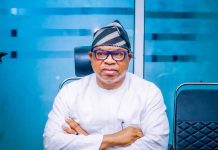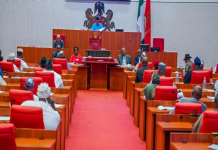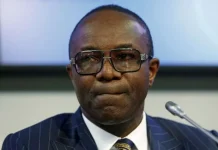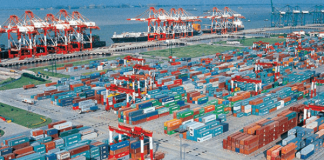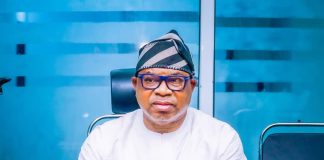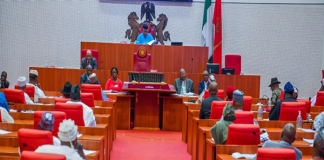🌿 Ruzu Non-Alcoholic Herbal Bitters
Ruzu Non-Alcoholic Herbal Bitters is a natural health supplement specially formulated to:
- ✅ Promote general wellness
- ✅ Detoxify the body
- ✅ Support the treatment of various ailments
Made from a powerful blend of 100% organic and medicinal herbs, Ruzu is completely alcohol-free, making it ideal for:
- 👪 All age groups
- 🌱 Health-conscious individuals
- 🌿 Anyone seeking non-alcoholic herbal remedies
Whether you're looking to boost your vitality, cleanse your system, or support healing the natural way, Ruzu Bitters offers a trusted herbal solution.
On Wednesday, the World Bank voiced serious concern over Nigeria’s rising poverty rate, stating that approximately 139 million people still live in poverty in spite of recent attempts to stabilize the country’s economy.
If the government’s continuing changes don’t actually enhance the lives of regular Nigerians, the Bank cautioned, the country could lose the advantages made.
During the October 2025 Nigeria Development Update launch in Abuja on Wednesday, World Bank Country Director for Nigeria Mathew Verghis made the revelation under the headline “From Policy to People: Bringing the Reform Gains Home.”
Since the report’s publication, the Nigerian government, opposition parties, civil activists, and other groups have all continued to respond to its conclusions.
Many Nigerians believe the study reflects the hard realities of everyday living, but the Presidency has vehemently disagreed, calling the World Bank’s estimates unrealistic and unrelated to the country’s true economic circumstances.
The administration stated in a statement released Thursday by Sunday Dare, President Bola Tinubu’s Special Adviser on Media and Public Communications, that the poverty numbers need to be appropriately placed within the framework of international standards for measuring poverty.
Although Nigeria cherishes its collaboration with the World Bank and its contributions to policy research, the cited figure has to be appropriately contextualized. Dare wrote on his official X account, “It is not realistic.”
The 139 million poverty estimate, according to the Presidency, was based on the global poverty line of $2.15 per person per day, which was established in 2017 using the Purchasing Power Parity (PPP) model.
The government claims that this figure does not accurately reflect the number of Nigerians living in poverty.
The argument went on to say that the global poverty line of $2.15 per day, when converted to local currency, is an analytical construct rather than a real-time reflection of economic realities because it is greater than Nigeria’s new minimum salary of ₦70,000, or roughly ₦100,000 per month.
“Reducing poverty is a priority for President Tinubu’s administration. According to the presidency, Nigeria rejects inflated statistics interpretations that are disconnected from local realities.
But not everyone shares the government’s viewpoint. In a statement released Thursday, the African Democratic Congress (ADC) asked President Bola Ahmed Tinubu to embrace the recent World Bank study that revealed a dramatic increase in poverty in Nigeria.
Millions of people’s living situations have gotten worse as a result of his administration’s economic policies, according to ADC.
Mahdi Shehu: “North has been lowered to the level of slaves.”
The recent World Bank study, according to civil rights activist Mahdi Shehu, is a reflection of the terrible reality that people have been dealing with for years.
According to Shehu, who spoke in an exclusive interview on Thursday, the revelation was not shocking to those who are aware of the struggles Nigerians have had, particularly since 2015.
“Those who are aware of the hardships Nigerians have faced, especially since 2015, are not surprised by the World Bank’s report yesterday that 139 million Nigerians are suffering from severe hunger,” he stated.
“The hunger figure only represents a small portion of the larger tragedy unfolding in the country,” Shehu continued.
“When you combine this number with the more than 30 million children who are not in school, the 600 children who die every day from severe malnutrition, and the rising unemployment rate, you will see the full extent of Nigeria’s present dejection, hopelessness, decay, and despair,” he said.
According to him, Nigeria has devolved into a country where everyone is out for themselves, God is for everyone, survival of the fittest rules, and the devil takes the brunt of responsibility.
Particularly in the country’s north, the activist attributed the growing poverty to years of ineffective leadership and misguided goals.
According to him, social disintegration and economic dispossession have disproportionately affected the North.
“Nearer to 80 percent of the population has been forced into permanent, irreversible economic bondage, making the northern part of Nigeria the worst hit in terms of economic dispossession,” Shehu bemoaned.
He claimed that this state has resulted in a total collapse of ethics and morals, shattered homes, malnourishment, a rise in mortality from avoidable illnesses, and hopelessness.
Speaking further, Shehu claimed that democracy has only resulted in suffering and suffering for the local populace.
“Democracy has no meaning for many in northern Nigeria. It is a system that has damaged their well-being, shattered their unity, their trade, and their commerce, and lowered them to the status of slaves in a nation where they are supposedly citizens,” he remarked.
Ordinary Nigerians feel abandoned and deceived as a result of the condition, he said, criticizing political leaders for ignoring the poor while benefiting themselves.
“The people suffer in quiet while the authorities live in luxury and ease. He came to the conclusion that the current system of oppression, which is fueled by dishonesty, fear, and hunger, is not democracy.
Bello: Rejecting the report is an injustice to the poor.
A politician and public affairs analyst named Hon. Jafar Sani Bello stated in an exclusive interview on Thursday that it would be unfair and insulting to the millions of impoverished Nigerians who are directly impacted by the nation’s economic struggles to disregard the most recent poverty report issued by a respectable international organization.
Even though it is unsightly and unpopular, he claims that the article accurately depicts the hard reality that many Nigerians, particularly those in the north, must deal with.
“It’s a report from a credible organization, and even though it looks ugly and unappealing, we have to accept it and find ways to help those who have been caught online,” Bello stated.
“It will be a serious injustice and insult to those impacted if the report is dismissed.”
He clarified that because of a number of security and economic issues, poverty has been most severe in the northern region.
“I think there are a lot of reasons why the North is negatively impacted,” he stated.
“Importation policies that allow agricultural staples like rice and maize to be imported and the extremely high price of fertilizer have made matters worse.”
Bello pointed out that because the cost of production greatly exceeds the price at which their produce is sold, the majority of farmers in the north now find it difficult to make ends meet.
“The farmers, who are mostly from the north, cannot justify the production costs based on the prices of the produce,” he stated.
“The economic situation in the region has deteriorated due to this and the negative impact of insecurity that has wreaked havoc on the North with no end in sight.”


